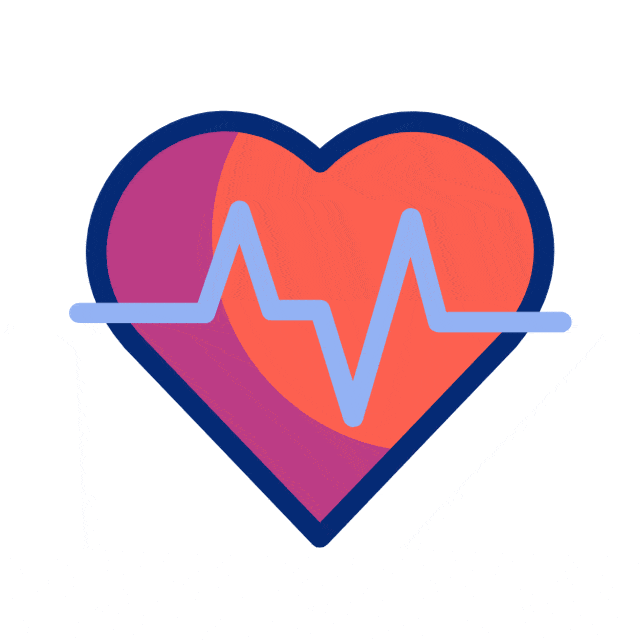Category : Cardiovascular
The prevalence of heart diseases is steadily rising in India since the last 2 decades. Cardiovascular disease(CVD) are leading cause of deaths and one in 4 deaths in India are now because of CVDs with heart attacks and stroke responsible for majority of it. Smoking is the leading cause of heart attacks, followed by Diabetes, a sedentary lifestyle, psychosocial stress and hypertension. An unhealthy diet, high blood cholesterol levels are some of other important contributory causes for poor heart health. Following are the seven ways to keep the heart healthy and prevent other diseases like diabetes, hypertension, obesity, high cholesterol or keep them under good control.
7 ways to keep your heart healthy :
1. DIET
2. AVOIDING SEDENTARY LIFESTYLE & REGULAR PHYSICAL ACTIVITY/EXERCISE
3. WEIGHT REDUCTION/MAINTAINING IDEAL BODY WEIGHT
4. MANAGING STRESS
5. TO QUIT SMOKING/TOBACCO USE & MODERATION IN ALCOHOL INTAKE
6. MANAGING RISK FACTORS SUCH AS DIABETES, HYPERTENSION, DYSLIPIDEMIAS & KEEPING THEM UNDER CONTROL 7. RELAXATION-YOGA & MEDITATION.
1.DIET
The recommendations are to balance caloric intake and physical activity to achieve and maintain healthy body weight;
- Consume a diet rich in vegetables and fruits;
- Choose whole-grains and high-fiber foods; consume whole fruits instead of fruit juices to increase fibre intake.
- Non-vegetarians can consume fish, especially oily fish, at least twice a week;
- Limit intake of saturated fat to <7% of energy, trans-fat <1% of energy, and cholesterol <300 mg/d by choosing lean meats and vegetable alternatives,
- Fat-free (skim) or low-fat (1% fat) dairy products and minimize intake of partially hydrogenated fats;
- Minimize intake of beverages and foods with added sugars; choose and prepare foods with a little salt, and avoid adding extra salt in food.
- While eating food outside the home, follow the diet recommendations.
2. AVOIDING SEDENTARY LIFESTYLE –BY REGULAR PHYSICAL ACTIVITY/EXERCISE
Regular physical activity is essential for maintaining physical and cardiovascular fitness, maintaining a healthy weight, and sustaining weight loss once achieved.
- Take stairs whenever possible.
- Take a break after every 1hr from desk job.
- Practice any of these exercises for a minimum of 150 minutes per week-Walking, swimming, Cycling or any other equivalent exercises.
- Doing house chores by yourselves.
3. WEIGHT REDUCTION/MAINTAINING IDEAL BODY WEIGHT
Obesity is an independent risk factor for cardiovascular diseases.
Excess body weight increases blood pressure, blood sugars and bad cholesterol levels, decreases good cholesterol levels and increases the risk of developing coronary heart disease (CHD), heart failure, stroke.
People should avoid inappropriate weight gain during childhood and subsequent weight gain during adult years.
4.MANAGING STRESS
Everyone experiences stress which can be triggered by small daily hassles to major events such as divorce, loss of job or a loved one, Psychosocial stress at work or home are some of the important cause for mental and physical changes including rising in heart rate and blood pressure.
Tips to manage stress :
- Spending time with family, friends or pets
- Prayer, deep breathing and relaxation exercises
- Taking a nap
- Going for a walk or hike, getting enough exercise and balanced diet
- Listening to music, writing
- Laughing often. Laughter is a great way to reduce stress hormones
- To set realistic goals and expectations
- Positive approach towards life and facing problems
- Being grateful
5. TO QUIT SMOKING & MODERATION IN ALCOHOL INTAKE
Smoking is the most important and preventable cause of heart attacks and deaths. It increases heart rate, raises blood pressure and cholesterol levels, tightens major arteries of the heart, increases levels of fibrinogen which increases the risk of blood clotting.
There is no safe amount of smoking and even light or occasional smoking can damage blood vessels. Secondhand smoking can as well damage the lungs and cause a heart attack or stroke. Hence avoid the use of all forms of tobacco products and minimize exposure to secondhand smoking.
After an individual stops smoking the risk of heart attacks, cancer, stroke starts decreasing immediately and 5 years later, the risk becomes equal to non-smokers. Alcohol provides “empty calories” and is devoid of other nutrition. 1 gram of alcohol provides 7 Kcals compared to 4 Kcals from carbohydrates, If at all used, it must be in moderation, as it increases obesity, blood cholesterol levels and blood sugar levels.
6.MANAGING OTHER DISEASES WHICH CAN LEAD TO HEART ATTACKS- HYPERTENSION, DIABETES, DYSLIPIDEMIAS
A normal BP is a systolic BP <120 mm Hg and a diastolic BP <80 mm Hg.
High blood pressure is a strong, consistent, continuous, independent risk factor for cardiac, renal disease and stroke.
Dietary factors known to lower BP are reduced salt intake, weight reduction, moderation of alcohol consumption and adopting an overall healthy diet.
A normal fasting glucose level is ≤100 mg/dL, whereas diabetes is defined by a fasting glucose level ≥126 mg/dL. Hyperglycemia and the often-associated insulin resistance are related to numerous cardiovascular complications,
Reducing caloric intake and increasing physical activity to achieve even a modest weight loss can delay the onset of insulin resistance and improve glucose control.
In Individuals who have established diabetes, hypertension and high cholesterol levels, regular check-up, follow with doctors and strict adherence to lifestyle measures and medications will prevent developing cardiac diseases and stroke to a large extent.
7. RELAXATION TECHNIQUES -YOGA & MEDITATION
The traditional Indian system, now gaining international acceptance is useful in the management of heart health, control of Diabetes and blood pressure. It includes-Asanas, Pranayama and Dhyana are very beneficial when done regularly under expert guidance.
Benefits of Yoga for heart health
- Improves blood circulation
- Weight reduction
- Reduces blood pressure
- Reduces anxiety, stress and promotes relaxation
General benefits of Yoga
- Positive effects on digestion, endocrine and reproductive systems
- Improves concentration and will power
- improves posture and flexibility, improves the general sense of well-being





